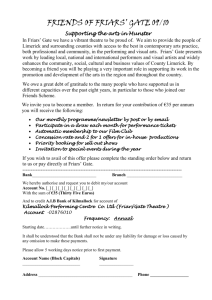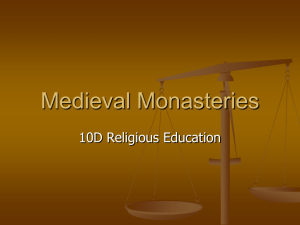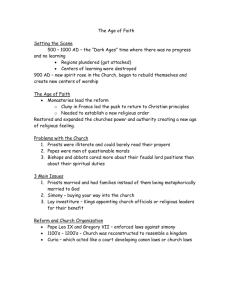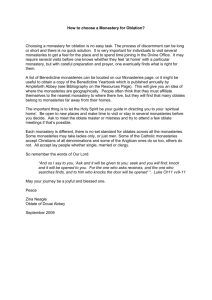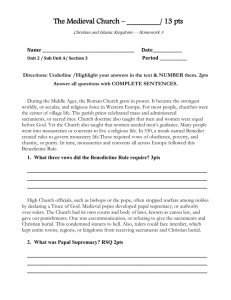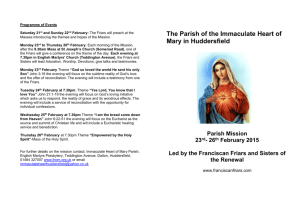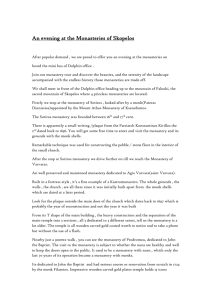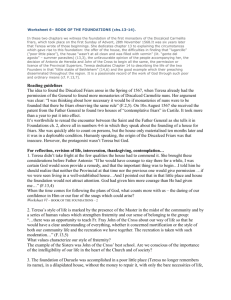Krnov - Goryl - Stopy totality
advertisement
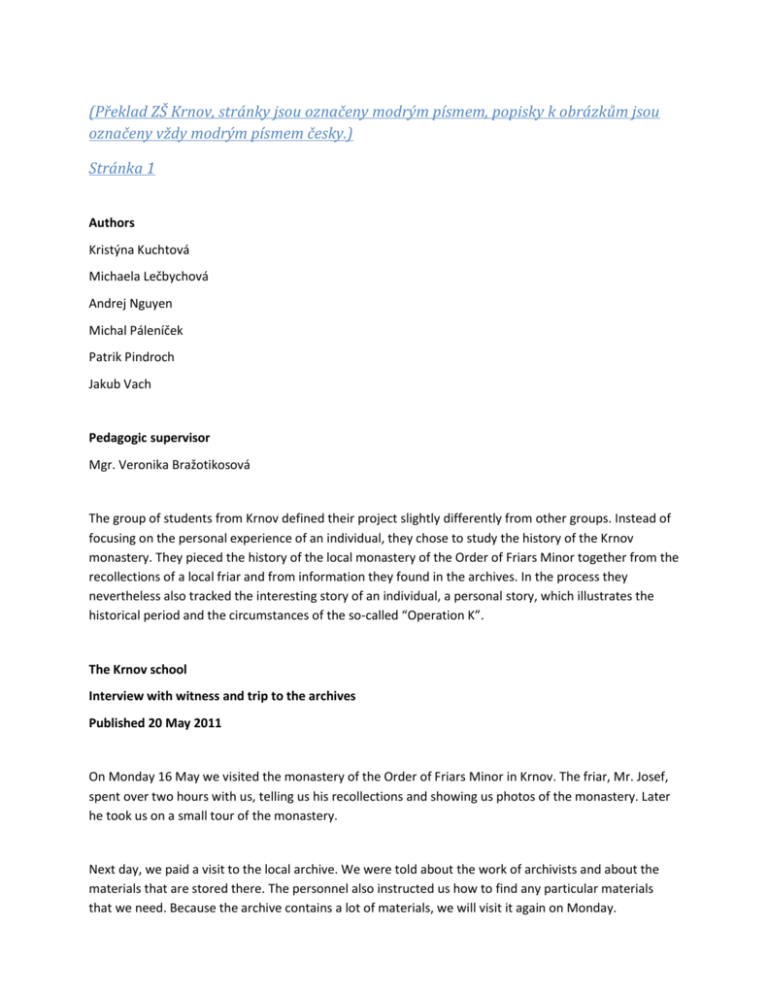
(Překlad ZŠ Krnov, stránky jsou označeny modrým písmem, popisky k obrázkům jsou označeny vždy modrým písmem česky.) Stránka 1 Authors Kristýna Kuchtová Michaela Lečbychová Andrej Nguyen Michal Páleníček Patrik Pindroch Jakub Vach Pedagogic supervisor Mgr. Veronika Bražotikosová The group of students from Krnov defined their project slightly differently from other groups. Instead of focusing on the personal experience of an individual, they chose to study the history of the Krnov monastery. They pieced the history of the local monastery of the Order of Friars Minor together from the recollections of a local friar and from information they found in the archives. In the process they nevertheless also tracked the interesting story of an individual, a personal story, which illustrates the historical period and the circumstances of the so-called “Operation K”. The Krnov school Interview with witness and trip to the archives Published 20 May 2011 On Monday 16 May we visited the monastery of the Order of Friars Minor in Krnov. The friar, Mr. Josef, spent over two hours with us, telling us his recollections and showing us photos of the monastery. Later he took us on a small tour of the monastery. Next day, we paid a visit to the local archive. We were told about the work of archivists and about the materials that are stored there. The personnel also instructed us how to find any particular materials that we need. Because the archive contains a lot of materials, we will visit it again on Monday. Stránka 2 Popisek foto (kostel) Pilgrims‘ church of Virgin Mary of Seven Sorrows at Cvilín, the church of Heinrich Ponta Box „motivační otázky“ For middle school: 1) Who was Heinrich Ponta? 2) What was he sentenced for and how many years was his prison sentence? 3) How did the communist regime treat the friars of the Order of Friars Minor? 4) Who is Josef Goryl? What was unusual about the way in which he became a member of the Order of Friars Minor? Additional questions for high school: 1) In what way was Heinrich Ponta carrying out espionage, according to the accusations of the communist regime? 2) Josef Goryl decided that he wanted to study theology. What happened to him in consequence of that choice? 3) Was the Church free to decide who can become priest and to which district, town or village will that priest be assigned? Stránka 3 The recollections of friar Goryl – The story of Heinrich Ponta „Heinrich Ponta was not a friar in 1950 but he worked here as Church-keeper. He was taking care of everything around here, he devoted his life to the monastery and to Cvilín. He was a citizen of Austria and so, even in the 1950s, he was permitted to leave the country and to return again. During those times, he went to Austria twice. When he returned, he was accused of giving away secret information to foreigners. He worked as a delivery man for bakeries. Whenever he would drive around with the bread and the buns, he would also stop at the army barracks. Because of this, they were able to accuse him that he new the number of men stationed in the barracks and that he disclosed this information to the Vatican. They were probably suggesting that the Vatican was planning to instigate a coup here in Krnov, attack the barracks, shoot all the soldiers there, or some other nonsense. He was sentenced to 8 years in prison, but in the end he was only imprisoned for two or three years. He was released early thanks to our brothers in Vienna, who pleaded for him with the Austrian ministry. He had some good friends at our monastery in Vienna. As a result, the authorities arranged an exchange – him for an agent that was captured by the Austrian police. At the time he was not a member of the order, but even before his imprisonment, he has already contacted us and he secretly joined. Therefore, although not officially, he in fact was a member of the order. When he came out of prison after 3 years, he was told that he must leave the country within 48 hours. All of his property was to be confiscated, but as he hade none, they had nothing to confiscate. He left the country that very summer, but when there was a pilgrimage at Cvilín in September, he came and took part in the pilgrimage and escaped to Austria again immediately afterwards. So, imagine, he was risking another arrest, just to be here for the pilgrimage. After some years he was no longer prohibited from coming here so he could come openly. I recall having met him even during the time of the communist regime, but we didn’t talk much. It was not safe, he was watched by the secret police, they wanted to know who he is talking to, with whom is he meeting. He died in 2005 or 2006 in Vienna.“ Stránka 4 Interview with father Goryl Were you born in Krnov? No, I come from Třinec, I used to live in a village near Třinec. But I usually say that Třinec is my village. What brought you to Krnov and when did you come here? I came here in 2000. Before that I was a seminar member in Prague. I was ordained in Brno and remained there for eight years. After that, I came here in 2000 and remained here for four years and then went back to Brno once again. Then, later, I moved to Krnov again. Is your family catholic? Yes, I was baptized as a child, 15 days after my birth, and I was brought up in a catholic family. I attended lessons of religion. Did you encounter any difficulties as a result of your participation in lessons of religion? There were problems, but, you know, that just got me interested even more. For example, when my teacher tried to ridicule me in front of the others in classroom. I participated in holy masses at church as an acolyte. Did you have difficulties because of your religion when you applied to high school? No, I was accepted to high school without any problems. Only later, when I wanted to study theology at the University. I was proud of my religion and they could easily see that, which is why I was dangerous for them. When I applied to theology, the secret police came to my school. The director of the school came to my classroom and said: “Goryl, come to my office.” When we got there, he began screaming at me until he began spitting foam from his mouth. Then the two officers entered, in long leather coats. It was a cross-examination. Then there were suddenly three of them. One acted as the nice guy, while the other just kept poking at me, asking questions and the third kept silent, showing no emotions. Already then, which was my first examination from the police, they knew almost everything about me. It happened repeatedly afterwards. It was always very similar. When I took the train to school, there would be two men waiting at the station. They would follow me all the way to school and, later, when I was returning from school, there would again be the two men in the street, waiting for me. It went on like this for about a month. One of those days, I paid a visit to one of our fathers, a secret member of the order. When he opened the door, he looked at me and immediately knew that something was wrong with me. “Josef, what is going on?” he asked. I was so distracted that I didn’t even find the courage to tell him what has been going on. “Now, listen, they came to you, didn’t they? The one acted as the nice guy, while the other was mean, right?” “Yes”, I replied. “ So there you go, it happens to me all the time. I have to report at their headquarters. Last time the officer says: ‘Man, you don’t seem to realize how tough these times are. There may be a guy just walking down the street and all of the sudden, he gets run over by a car. Or, imagine him just walking down the stairs and all of the sudden, down he falls, his neck is broken. People get hurt even if they don’t even leave their house at all’.” And our father then said to him: “You are right, now it is me, tomorrow it may be you.” And he went on: “I found out that after that questioning the officer was diagnosed with cancer and committed suicide at the hospital using his service pistol. So I was wrong, not me and then you, but the other way around.” So, after that, nothing could surprise me anymore. I had to wait for several years before I got accepted to study theology at the University. But I didn’t mind. I told myself, the more difficult they try to make it, the better, at least my faith will grow stronger, my conviction will become firmer. They must have realized that they can’t do anything with such a man, so they finally let me be accepted to study theology at the University. Stránka 5 (první otázka rozhovoru na této stránce) When did you become member of the order? In 1980. Did you obtain a permission or was it in secret? It was in secret. Can you describe what was the procedure for joining the order in secret? Well, it isn’t any different from the usual way, you submit an application, only everything has to be in secret. Not even my parents knew. At that time, the fathers were afraid to secretly accept any new members. I knew that they were afraid, so I entered the order in Warsaw and became a member of the Warsaw community. At first I lived with my mother, then I did my service in the army, two years. Meanwhile, I submitted applications to the seminar, but not as a friar. I had to keep that a secret from everybody, including the bishop. So I made the application to the seminar three times, but they didn’t accept me because they were suspicious. And why were they suspicious? Well, I was just a bit older than you are at that time, I liked to play soccer, I played the guitar. I used to hang out with other young people, we liked hiking, we visited the pilgrimage sites. This was known to them. So I was regarded as a subversive element. One had to have a clean record with the authorities, which I didn’t have. One had to be hundred percent loyal, which I was not. It was the secret police that decided who would be accepted in the seminar and who would not. It was not the bishop or the friars. Officially, it was the ministry of culture, who had the authority to decide. At the ministry there was a Department of Church Matters, headed by Mrs. Janková. When I was denied membership for the third time, I went to the ministry and requested a meeting with that lady. Of course I was refused, but I didn’t give up and later I managed to run into her in the hallways of the ministry. I introduced myself and asked why my application was rejected. I told her that I never received an explanation and was just informed that I did not meet the requirements. So I asked her to kindly explain to me what those requirements were, perhaps I will be able to meet them, if she lets me know what they are. “Well, you know, there are various requirements…”, she started, but she sidestepped giving me any explanation. Ultimately, I was accepted in the seminar in 1987, but the situation was quite different by then. In the 90s, did all the friars return to the order? Not many were still alive, but those who were did return to the monasteries. With the exception of three – one was already very ill, another remained at a vicarage, and the third was also very ill. But all of the others did return. There is not a lot of members of the Order of Friars Minor in the Czech Republic, right? No, there is just a few of us, we are twenty in all. And in the year 1950? We were not many more in 1950, we were about 35. And then there were those associated brothers, some of whom were released after their internment but were not allowed to be active as friars. They would have to obtain official permission, which they did not receive, being regarded as “subversive elements”. Those brothers had to look for jobs in factories and similar jobs. Some of them did receive an official permission to become active in the Church later on, some even in our monasteries. But the monasteries were no longer our property. Also, the brothers were no longer allowed to form communities and had to live separately. Stránka 6 Krnov – the monastery of the Order of the Friars Minor and the story of the political prisoner Heinrich Ponta, based (not only) on the memories of father Josef Goryl The origin of the monastery of the Order of the Friars Minor in Silesian Krnov date back to the second half of the 13th century. The Order of the Friars Minor originated as a branch of the Franciscan Order, founded by Saint Francis of Assisi (1182-1226). Besides Krnov, the Order of the Friars Minor is currently present in monasteries in Prague, Brno, Jihlava and Opava. The Krnov monastery was the property of the Order until 1950 when it was confiscated by the state. As a consequence of Operation K, the Order of Friars Minor had to cease their activities. The members of the Order were all interned at a monastery in Bohosudov near Teplice in North Bohemia. Together with Fransciscans, Jesuits and others, they were held there and subsequently sent to perform forced service in the army in special technical divisions (so called “PTP”, which is an abbreviation for “auxiliary technical divisions”). A number were tried in fake political trials. According to father Josef Goryl, none of the friars from Krnov were sentenced in the initial wave of trials. The regime waited until 1958 to initiate proceedings against them. Meanwhile it was decided that the monastery in Krnov will become an institution for children with serious mental disabilities. Nuns from Velehrad in Southern Moravia were brought here to take care of the children. However, due to unsatisfactory hygienic conditions, the institution had to be moved elsewhere. In 1968, after the suppression of Prague Spring by armies of the countries of the Warsaw Pact, the monastery was taken over by officers of the Soviet army. In the 70s the monastery was transformed into a hotel. Most of its guests were German tourists. They came here, because their ancestors formed the majority of the town’s population until 1945, when they were forced to leave the country. The Order of the Friars Minor returned to Krnov after five decades, at the beginning of the 21st century, to rebuild an active community at the monastery. Stránka 6, popisek k obrázku Exterior of the monastery in krnov Stránka 6, historický box Operation K A police operation directed against monasteries, which took place during the night of 13th and 14th April 1950. The Secret Police aided by People’s Militias closed entrances to monasteries, secured the bells so that the friars would not be able to call for help and arrested all the inhabitants of the monasteries. All the inhabitants of the monasteries were then interned in so-called “centralization monasteries”. A second part of the operation took place during the night of 27 and 28 April and a third part, directed against women’s monasteries, followed in the autumn of 1950. According to the Czech Bishops’ Conference organization the operation affected 247 men’s monasteries, 670 women’s monasteries, 2528 friars and 11,896 nuns. For details, see Mr. Kohl. Stránka 7 Heinrich Ponta Father Goryl also tells us about Heinrich Ponta, who worked as a Church-keeper at the Church of the Virgin Mary and also at a nearby pilgrim’s church situated on a hill called Cvilín, prior to the events of the 1950s. Ponta was an Austrian citizen, and so, unlike Czechoslovakian citizens, he was able to travel relatively freely to Austria even in the 1950s. However, these travels made the Communist authorities develop suspicions that Ponta was engaged in espionage. Therefore, the authorities began to look for ways to prevent Mr. Ponta from making these trips. He worked as a delivery man for bakeries. Whenever he would be delivering the bread and the buns, he would also stop at the army barracks. Because of this, they were able to accuse him of gathering secret military information, which he was supposedly disclosing to the Vatican, where they would (supposedly) be used in preparations of a coup against the Czechoslovakian regime. He was sentenced to 8 years in prison. Meanwhile, however, he secretly joined the Order of Friars Minor, and was finally released early thanks to the pleading of friars of the order in Vienna. He was told that he must leave the country within 48 hours. He left the country for Austria, but when there was a pilgrimage at Cvilín that very same year, he came and took part in it. He was risking another arrest and imprisonment. After some years he was no longer prohibited from coming to Krnov. Mr. Goryl however recalls that he couldn’t discuss his experiences with Mr. Ponta, since until 1989 that would attract the attention of the secret police. Summary The story of the monastery of the Order of Friars Minor in Krnov shows the consequences of the Operation K for the Minorite community in this town. The friars were deported hundreds of kilometers away to the north of Bohemia and for decades they were unable to pursue their calling. They are now again active in Krnov, but numerous monasteries were less lucky and have disappeared or are now falling apart. In such places, we see, still today, the consequences of the repressive activities of the totalitarian state against Church organizations. Stránka 7, horní historický box (o PTP) PTP (“auxiliary technical divisions”) and politically unreliable individuals So-called politically unreliable individuals were placed in auxiliary technical divisions (PTP – pomocné technické prapory). Whether an individual was politically unreliable was decided by the authorities based on information collected in the individual’s place of residence. Individuals could be placed into the PTP also based on the decision of a special military committee. Especially individuals representing the classes that were targeted by the regime after February 1948 were sent to the PTP. These were private farmers, business men, entrepreneurs, priests, friars or students who were expulsed from the Universities. Men aged from 17 to 60 years could be sent to PTP, even sons of politically unreliable individuals could be sent to a PTP. The so-called category E, consisting of politically unreliable individuals and representing the majority of the members of the PTP, was abolished only in 1954 together with the last PTP. Even after this there still existed so-called “technical divisions”. See also text on PTP and panels devoted to Mr. Goryl, Mr. Kohl and Mr. Lysý. str. 7, popisek u mapy ČSR Division of the Czechoslovakian territory after 1939 str. 7, dolní historický box Deportation of German inhabitants from Czechoslovakia after the second world war German speaking people were present on Czech territory for centuries. They inhabited a continuous belt of territory stretching along modern borders with Germany, Austria and Poland. In some places this belt was wide and reached far into the Czech territory. Today this area is called the Sudetenland (although this is geographically imprecise). In the time between 1st world war and 2nd world war almost 3 million Germans lived in the country, representing approximately a third of the total population. Following the occupation of Czechoslovakia by the Third Reich the Sudetenland became part of the Nazi state. The remainder of Czech territory was transformed into the Protectorate of Czechia and Moravia. After the war, Germans were blamed collectively for the war by the Czechs, leading to the expulsion of almost the entire German population from the renewed Czechoslovakia. The expulsion was supposed to take place orderly, however the events unfolded differently. Thousands of Germans fell victim to massacres in 1945 during the so-called “wild relocation” of Germans. str. 7, poznámka pod čarou Source of picture: Wikimedia Commons
